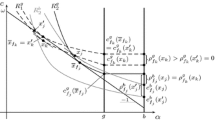Abstract
Using a two-country dynamic optimization model where the less patient country decumulates and the more patient one accumulates wealth, we analyze spillover effects of lump-sum and consumption taxes. A lump-sum tax on a country definitely harms the other country through a change in the rate of interest. A lump-sum tax on either country always improves the less patient country's asset position. A consumption tax has no spillover effect, although it is Pareto-inferior. Applying these results into a closed-country context with heterogeneous agents, we also discuss policy implications of a discriminatory tax.
Similar content being viewed by others
References
Becker, R. A. (1980): “On the Long-run Steady State in a Simple Dynamic Model of Equilibrium with Heterogeneous Households.”Quarterly Journal of Economics 95: 375–382.
Bewley, T. (1982): “An Integration of General Equilibrium Theory and Turnpike Theory.”Journal of Mathematical Economics 10: 233–267.
Blanchard, O. J., and Fischer, S. (1989):Lectures on Macroeconomics. Cambridge, MA: MIT Press.
Buiter, W. H. (1987): “Fiscal Policy in Open, Interdependent Economies.” InEconomic Policies in Theory and Practice, edited by A. Razin and E. Sadka. New York: St. Martins Press.
Chari, V. V., and Kehoe, P. J. (1990): “International Coordination of Fiscal Policy in Limiting Economies.”Journal of Political Economy 98: 617–637.
Devereux, M. B., and Mansoorian, A. (1992): “International Fiscal Policy Coordination and Economic Growth.”International Economic Review 33: 249–268.
Djajic, S. (1987): “Effects of Budgetary Policies in Open Economies: the Role of Intertemporal Consumption Substitution.”Journal of International Money and Finance 6: 373–383.
Frenkel, J., and Razin, A. (1985): “Government Spending, Debt, and International Economic Interdependence.”Economic Journal 95: 619–636.
— (1987):Fiscal Policy and the World Economy. Cambridge, MA: MIT Press.
Ikeda, S., and Ono, Y. (1992): “Macroeconomic Dynamics in a Multi-Country Economy: a Dynamic Optimization Approach.”International Economic Review 33: 629–644.
Kehoe, P. J. (1987): “Coordination of Fiscal Policies in a World Economy.”Journal of Monetary Economics 19: 349–376.
— (1989): “Policy Cooperation Among Benevolent Governments May Be Undesirable.”Review of Economic Studies 56: 289–296.
Obstfeld, M. (1981): “Macroeconomic Policy, Exchange-rate Dynamics, and Optimal Asset Accumulation.”Journal of Political Economy 89: 1142–1161.
Ono, Y., and Ikeda, S. (1996): “International Welfare Effects of Saving Controls and Trade Restrictions.” InOrganization, Performance and Equity: Perspective on the Japanese Economy, edited by R. Sato and R. Ramachandran. Dordrecht: Kluwer (forthcoming).
Ono, Y., and Shibata, A. (1992): “Spill-Over Effects of Supply-Side Changes in a Two-Country Economy with Capital Accumulation.”Journal of International Economics 33: 127–146.
Ramsey, F. (1928): “A Mathematical Theory of Saving.”Economic Journal 38: 543–559.
Author information
Authors and Affiliations
Rights and permissions
About this article
Cite this article
Ono, Y., Ikeda, S. Fiscal policy, wealth divergence, and lifetime utility. Zeitschr. f. Nationalökonomie 64, 265–280 (1996). https://doi.org/10.1007/BF01250129
Received:
Revised:
Issue Date:
DOI: https://doi.org/10.1007/BF01250129




